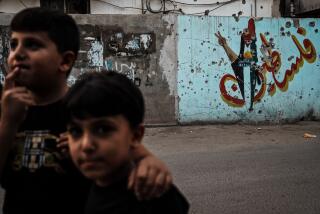YES, TELL THE CHILDREN
- Share via
Do we want our children to remain silent and inactive in the face of injustice? Your Page 1 headline, “Should Our Children Be Told?,” twisted and turned in my mind.
Under discussion was Nina Barrett’s appraisal of Roberto Innocenti’s “Rose Blanche” (March 31), a “picture book” about a German child who turns from flag-waving patriot to secret, food-laden friend of Jewish children in Hitler’s concentration camps.
While I’m grateful for Barrett’s serious consideration of “Rose Blanche,” I think that she may frighten off many parents, teachers, religious homilists and the 7-year-olds who have every bit as much need to be introduced to this great book as does the junior high student who has already read “The Diary of Anne Frank.”
Ever since “Rose” came out in the U.S. in 1985, I have shared it with thousands of students. Second- through sixth-graders--and high school seniors--sit in rapt attention when it is read. . . .
Innocenti says, “In this book I want to illustrate how a child experiences war without really understanding it.” So he tells it from a child’s perspective. Barrett finds “this childish bewilderment . . . perhaps one of its most disturbing elements.” She’d like an explanation for this and for that.
But how honest! And how appropriate for children! While Barrett deems the American text “vague and dreamlike,” this may be part of the mystery in “Rose Blanche” that so attracts children. Just as children may see a mother pregnant, a baby born, and the subject may affect them deeply, they still may have little inkling about the whole process. They may see a dog beaten and react with anguish without understanding the psychology behind the beating.
Children do not have to have a great knowledge of fascism in order to relate, as Rose Blanche does, to the young boy struggling to escape from a disabled truck only to be stopped by a fat mayor with a Nazi armband. She, and they, just see a scared kid. . . .
Innocenti’s “Rose Blanche” paid for her kindness with her life. But while reviewer Barrett finds the plot “grim” and “stark,” I think that children are attracted by the story of a mere child bringing love and daring to share in the suffering of children confronted by the ferocity of the Third Reich. They see her as a real hero.
Why do I have to share “Rose Blanche” with the children? I read it because of the two undocumented Mexicans who risked deportation (and refused a reward!) to help my family when our car was disabled on a Los Angeles freeway. I read it for Duc and Vuong Le, Vietnamese boat people who worked summers at the library when they were in high school and who had smiles a mile wide even though an ocean and politics separated them from their parents. I read it for our Japanese-American friends whose son tried to prove himself a good American in Vietnam and could never shake the depression he got there and committed suicide.
Finally, I read books like “Rose Blanche” for myself, so that I may be surrounded by people of courage and hope.
LIZ OGREN KRIEGER, Head of Children’s Services, San Luis Obispo City-County Libraries, SAN LUIS OBISPO
More to Read
Sign up for our Book Club newsletter
Get the latest news, events and more from the Los Angeles Times Book Club, and help us get L.A. reading and talking.
You may occasionally receive promotional content from the Los Angeles Times.









